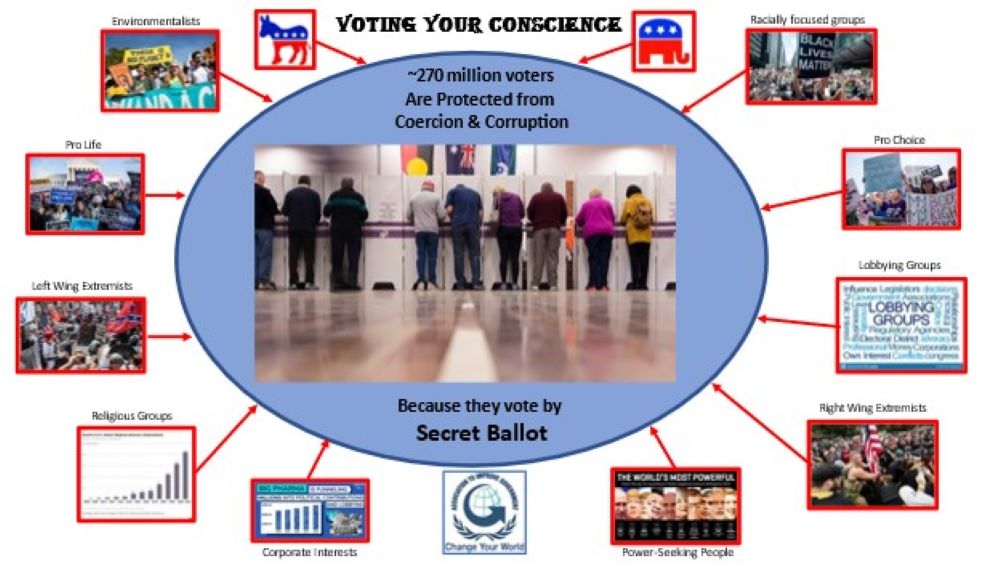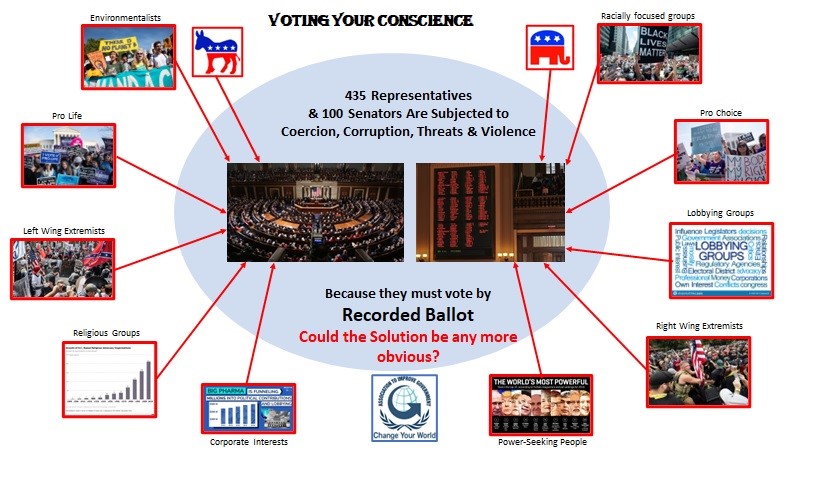Overview:
As all realize, the US is a Constitutional Republic, not a Democracy. So why do most continue to reference the ‘Great Experiment’ using the descriptor, ‘Democracy.’
The answer is relatively easy to understand. The formalities of a Constitutional Republic involve a written Constitution that protects individual rights in many cases. It limits the power of the government to protect individuals against the type of tyranny so common in authoritarian systems. The major decisions are made by a democratic process whereby individuals and their representatives vote on issues to decide on actions. The majority vote signals the will of the people and some of these situations include:
- The election of representatives to perform the duties involved in governing the country.
- Referendums to advise on public opinions on major societal issues of the day.
- The enactment of legislation which will establish the rules and laws of the country/state/etc.
- The creation of legislation by committees for presentation and review by the House and Senate.
Unfortunately, the Constitution itself does not specify the method of voting to be used to determine the majority and thus the will of the people. As the effort to expand the franchise widened over centuries, this important detail was likewise developing.
Originally, electing representatives was restricted to a relatively small group of land-owning and wealthy individuals who voted by notifying the local authority charged with the job of managing the election. The vote was open and public whereby anyone could see how every voter cast their ballot.
Once elected, the representatives voted with a more secret method. Even though the power of the monarch was being reduced, they knew they needed protection from the former absolute authoritarian of the realm. Recording votes was strictly prohibited to shield these delegates from coercion, threats and jeopardy.
In the mid 1800’s, the Chartist movement expanded the franchise to include all men aged twenty-one and above. One of the reforms of the People’s Charter of 1838 included the requirement that the voting system must be “secret ballot to protect the elector in the exercise of his vote.” This was adopted and established public election laws to assure the vote was secret. This continues to this day.
Later, the next round of suffrage movements added women and blacks to the mix and the voting population began to reflect a major percentage of the society. The secret ballot protects these voters from coercion, corruption and threats to allow them to vote their conscience in selecting their representative.
Their representatives did not have a formal secret ballot procedure but the yeas and nays system was somewhat covert. Recorded votes were rare and committee meetings were private to allow discussion and compromise when drafting legislation. The lobbyists were kept in the lobby.
The Theft Discovered:
According to the Pew Research Center, public trust in the US government during the first half of the 20th century consistently ranged in the 75% to 90% level. That metric began a serious downward trend in the mid to late 60’s as the Vietnam War, the Civil Rights Movement and political assassinations spawned a decade of protests and violence. The public wanted a solution, and that solution was found.
As always, the citizens blamed their government and wanted a solution that would hold their representatives more accountable. The concept viewed by most as the remedy called for transparency in government. It continues to this day as a belief that most accept.
The Congressional Reorganization Act of 1970 was enacted to realize the promised benefits of transparency in government. It had two specific requirements to assure all voters had the ability to monitor their representatives:
- It required all votes in Congress to be Recorded Votes.
- It required all Committee meetings to be open to the public.
The process that protected our representatives from coercion, corruption and threats was stripped away. From that point on, power-seeking individuals and wealthy special interest groups obtained the power to control legislation. This changed the balance of power in government from a situation where our representatives were in control and handed it to those that would assure their interests came before ‘we the people.’
Unfortunately, the general public has still not realized why Democracy is in jeopardy. The truth is that we stole it from ourselves. We enacted a panacea where the cure was more deadly than the disease and are now on a clear path to authoritarianism.
Adam Smith



No comments yet.